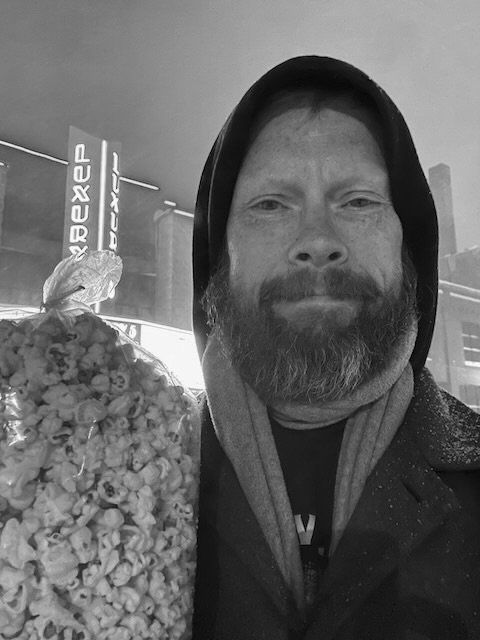On Stage
I love movie theaters—the dark room, the popcorn, the sense of anticipation, the climate control, which always seems to be a little warmer in winter and cooler in summer than strictly necessary. To a farm kid who lived an hour from the nearest theater, movies were an extravagance. That kid still lives inside me every time I walk into our downtown theater.
But the experience of watching a movie is very different from watching a play. Movies are all about spectacle and production and polish. For a film to succeed, the plot needs to be airtight, the acting perfect, the effects spot-on. Any flaw results in an undercurrent of judgment. You’d think they would have noticed that before they sent it out into the world.
A live play is very different. You hope for excellence, but you also understand that a thousand things can go wrong. The sound effects computer crashes mid-scene. A prop gets kicked under a set piece. A usually reliable actor forgets his lines or gets cracked up on stage. And of course, a dreaded phrase I don’t care to revisit in detail, wardrobe malfunctions. Stage plays—at least where I live—are less polished and more unpredictable than movies. There’s real risk in it.
Then there’s this:
When I see Ryan Reynolds on the big screen, I can’t really imagine myself in his place. The total budgets of the two dozen or so productions I’ve been in wouldn’t buy his green room snacks. I have neither his raw talent nor his classic good looks. When I see him tap dancing alongside Will Ferrell, I think it looks like fun. But I can’t imagine actually doing it.
Not so with live theater. I’ve been on stage in that setting plenty of times, enough to have experienced both glorious heights and staggering humiliation. When I watch from the audience, I empathize with the actors, even as I subtly critique what I might have done differently. I know what I must look like from their vantage point. I have a pretty good idea what they’re doing backstage.
My normal weekly view at Fusion UMC.
A similar thing is true when I go to church. Most weeks, I am on the stage in some capacity—usually playing drums or guitar, delivering a message once in a while. On my rare weeks off, I don’t know what to do with myself. Attending without being part of the production makes me feel lazy, and maybe a little useless.
I realize that most people don’t feel this the same way I do. Many of my friends don’t really want to be in front of people in any setting—artistic or religious or otherwise. They would rather stay in the background, which seems to me like a good spiritual practice. It’s easier to fight against pride when you aren’t used to standing under the lights.
Still, I think there’s something to be said for the impulse to participate, whether in theater or church or life in general. As anyone who pays attention to young kids could tell you, our fundamental wiring is not toward consuming, but creating. A four-year-old doesn’t care how well you can color. She only wants to know if you’ll share the crayons.
We adults aren’t so good at that anymore. We have gotten used to comparing ourselves to highly cultivated end products, not just in theaters but in the spaces where we work and play and live. We judge ourselves by other people (or their children) and decide we don’t measure up. Or worse, we hear how the critics talk about those courageous souls who try and fail, and we determine not to take any risks ourselves.
A little applied logic is enough to tell us that every human is in process and thus subject to failure and embarrassment. Hey, even Ryan Reynolds gets the occasional stomach bug. But rational thought has to work pretty hard to overcome the fears tucked away in the reptilian recesses of our brains. Despite what we know about how people work, we somehow continue to believe that others are in better shape than we are—that they do better work, have more friends, make more money, have more fulfilling relationships. We imagine that they have it more together, that we’ll never quite measure up.
We’re living in a stage play, but we worry like we’re on the big screen. It’s bonkers.
We could use a little more local theater and a little less blockbuster movie. Rather than compare ourselves to an over-processed film that took months or years to perfect, we would do better to hold our lives up to a medium in which ordinary people can do excellent work and somehow survive the occasional catastrophe.
That little shift in thinking might be enough to get us on stage, whether actually or metaphorically. After all, we weren’t designed to observe life, but to participate in it.


